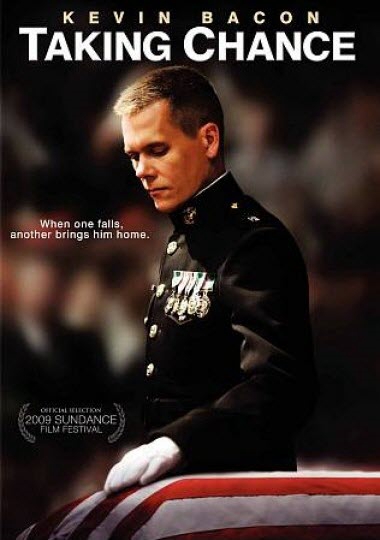
Description Based on the true experiences of Lt. Colonel Michael Strobl, who wrote eloquently of them in a widely circulated 2004 article, Taking Chance is a profoundly emotional look at the military rituals taken to honor its war dead, as represented by a fallen Marine killed in Iraq, Lance Corporal Chance Phelps. Working as a strategic analyst at Marine Corps Base Quantico in VA, Lt. Col. Strobl (Kevin Bacon) learns that Phelps had once lived in his hometown, and volunteers to escort the body to its final resting place in Wyoming. As Strobl journeys across America, he discovers the great diligence and dignity in how the military, and all those involved with preparing and transporting the body, handle their duties. Equally important, he encounters hundreds of people affected by Chances death, a vast majority of whom never knew him. This collective grieving eventually causes Lt. Col. Strobl, a veteran of Desert Storm now assigned to office duty, to probe his own guilt about not re-deploying to Iraq for the current conflict. Arriving in Wyoming, Lt. Col. Strobl completes his catharsis when he encounters Chances gracious family and friends, and discovers an extraordinary outpouring of community support.
Amazon.com The made-for-HBO Taking Chance is based on perhaps the single most moving artifact to come out of the Second Gulf War, Lt. Col. Mike Strobl's first-person narrative of his voluntary mission escorting the body of a fellow Marine killed in Iraq. Strobl (played in the film by Kevin Bacon) hadn't known Lance Cpl. Chance Phelps but, noticing they'd been born in the same western town, he requested temporary leave from his duties as a manpower-deployment analyst at Quantico in order to accompany the 20-year-old's body home. Home, as it turned out, was no longer their shared birthplace in Colorado but the high-country Wyoming town of Dubois. The journey would take Strobl deep into the heart of his nation, and his own heart as well. There's no overstating the power and beauty of what he encountered: one instance after another of not just military personnel but airline employees, passengers, and bystanders doing honor--mostly wordlessly--to Chance's coffin and his escort as they passed by. First-time director Ross Katz deserves credit for declining to inflate any of these moments or underscore their meaning with grandiloquent speechifying, and Bacon--an actor who couldn't hit a false note if his life depended on it--is true to the Desert Storm veteran's self-discipline and emotional discretion. The picture's decency is unimpeachable, and Strobl's story, transcending pro-war and anti-war politics, is itself an act of healing. What's missing is the seasoned hand of a great director (Ang Lee, say) to invest it with the rhythm and movement of a fully achieved feature film. Still, this is a journey you'll feel enriched by sharing. --Richard T. Jameson
On the DVD
Several somewhat overlapping short videos offer testimony to Chance Phelps's fun-loving spirit, heroic death, and spiritual legacy by his family, friends, and fellow Marines. They're good people. There's also a brief deleted scene--actually, portion of a scene--and some not particularly illuminating commentary on the making of the film. --Richard T. Jameson
